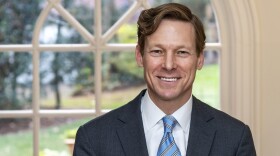At the very end of the Friday, Nov. 15th UNC Board of Governors meeting, Chairman Randy Ramsey made the kind of logistical announcement almost no one notices.
"Our next scheduled board meeting is December 13th," he told his fellow members. "I have decided we are going to do a call-in meeting as opposed to an in-person meeting. I think a lot of people are going to graduations. I know there are some conflicts on that day."
He then added: "We may even have a personnel matter to discuss at some point in December."
Twelve days later on Thanksgiving Eve, the board announced that it had struck a deal with the Sons of Confederate Veterans, giving the group the torn-down Silent Sam statue and $2.5 million.
That set up the Dec. 13 meeting to be highly significant and controversial. Not only would it be the first full board meeting after that deal, it also would be the session where the board hired a permanent chancellor for UNC-Chapel Hill, arguably the most prestigious university in the system. It was clear that Ramsey was referring to that high-profile hiring when he cited a "personnel matter" back in November.
And that December meeting all happened via teleconference, saving the board members from direct, face-to-face public scrutiny, protesters, and questions from reporters.
But did it really need to be over the phone?
Chairman Ramsey claimed, back in November, that "a lot of people are going to graduations. I know there are some conflicts on that day."
WUNC found that only three board members spoke or officially attended the four UNC system ceremonies on that Friday. The three board members – of 26 total - who had conflicts on the same day as the full board meeting were Lou Bissette, Philip Byers and Marty Kotis. They attended graduation ceremonies at UNC-Asheville, UNC-Greensboro and Appalachian State, respectively. An East Carolina University official confirmed to WUNC that no member of the Board of Governors attended the school's graduation in an official capacity.
Even the board member who appeared to have precipitated the scheduling change – Terry Hutchens – did not end up having the conflict he thought he would.
"I had asked Randy earlier that day (in November) if there would be a board meeting on (December) 13th and what time it would start," Hutchens told WUNC in an email. "I was considering attending the UNCG graduation which was scheduled for the 13th and needed to let the folks at UNCG (know) whether I would attend."
Hutchens did not end up attending the UNCG ceremony in an official capacity, according to school officials.
The call-in meeting setup was odd enough that at least one board member, Darrell Allison, was on-site in Chapel Hill for meetings with UNC System staff, yet still joined via telephone.

BOG Meeting History
The UNC Board of Governors holding a call-in only, regularly-scheduled meeting is unique in recent history. The board cancelled one full meeting last year as Hurricane Florence bore down, and then held a scaled-down version over the phone. It is common for a couple of board members to call in to almost every regular meeting, but a large majority have always attended the regular meetings in-person.
That has been true even when board members faced intense backlash for controversial decisions.
In January 2015, the board forced the ousting of then-President Tom Ross. It happened at an in-person meeting, and then-Board Chair John Fennebresque and Ross answered all questions afterward during a tense and awkward press conference.
One month later, in February 2015, the board voted to close the Poverty, Work, and Opportunity Center at UNC-Chapel Hill's Law School. The meeting in Charlotte, was interrupted by protestors, forcing the board to relocate to a smaller room. But media were still allowed in, and Ross and Fennebresque also held a media availability after.
In 2017, the UNC Board of Governors banned the Center for Civil Rights, based at the UNC-Chapel Hill Law School, from pursuing litigation – essentially shutting it down. Then-Chair Lou Bissette held the full board vote in-person, and addressed reporters afterward.
Motivation
That recent meeting history, the fact that only two board members had "graduation conflicts," and the controversy over the Silent Sam/Chancellor Guskiewicz decisions have all fed into the popular belief that Ramsey's actual motivation for re-scheduling the December meeting as a "call-in" was an effort to avoid public, face-to-face scrutiny.
Ramsey was not made available to WUNC for an interview or for further comment on what prompted him to re-schedule the meeting.
"It's just another example of their cowardice," said UNC-Chapel Hill graduate student and activist Lindsay Ayling. "They are making the extraordinary decision to use money from our university to fund a white supremacist organization, and when people object to that, they start holding all their meetings by conference call."
Ayling's comments came as she was sitting in a conference room watching and listening to a speaker phone this past Thursday. On the other end of the line, a Board of Governors committee tasked with university governance – the committee that voted on the Silent Sam deal – quickly went into closed session.
Residents of the state of North Carolina have no idea what they discussed.










